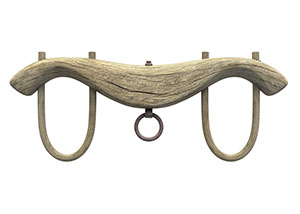That having been said, listen again to the familiar words of the Gospel. Jesus says to us (Matthew 11:28-30): “Come to me, all you who labor and are burdened, and I will give you rest. Take my yoke upon you and learn from me, for I am meek and humble of heart; and you will find rest for yourselves. For my yoke is easy, and my burden light.”
I’m glad you’re all sitting down, because what I am about to assert is a little shocking. It is no exaggeration to say that, in a very real sense, Jesus wants to be conjugal, yoked together, with each and every one of us. No, I will even go further. Our Lord wants to enter into a relationship with each and every one of us whose intimacy rivals that of a husband and wife. Now if you think I’m crazy, listen to this. What you are about to hear are some excerpts from a book entitled The Reed of God, by Caryll Houselander. Caryll Houselander was a Catholic English mystic and poet who died in 1954. Her book, The Reed of God, is a series of reflections on the Blessed Virgin Mary. It’s a wonderful book. This is what Caryll Houselander has to say:
On the night before He died, Christ took bread into His hands, blessed and broke it, and gave it to His disciples saying, “This is My Body.” The Blessed Sacrament is Christ—the whole Christ. He was giving us Himself. In so many other things, He laid the stress upon the invisible, the immaterial; His Kingdom, He said, is not of this earth: His peace is not of this world. Yet in giving Himself to the world, He deliberately chose to emphasize His Body. Why?
The body is for us the means by which we can give ourselves wholly. We say, “Go. My thoughts are with you,“ or “My soul goes with you.” And we know that, though something of our self is with the traveler, essentially we remain separate from him. We can give someone devoted care, unfailing kindness, and all our worldly possessions, but we still have kept our selves. But when we give our body willingly to another as the means of deliberate self-donation, then our union with the other is complete. We surrender our intimacy, the secret of ourselves, in the giving of our body. And we cannot give it without our will, our thoughts, our minds, and our souls.
Christ surrendered the secret of Himself to each one of us when He gave us His Body. In Holy Communion, the surrender of the secret of Himself goes on. “With desire,” He said, “have I desired this hour,” the hour when He was to consecrate bread in order that, not only to the whole race would He give His Spirit, but to each individual, the gift of Himself….
We incline to think that the comparison of Christ’s oneness with His Church to human marriage is an attempt to find a symbol for Christ’s love, that the marriage is the greater reality. But it is the other way about. The marriage of man and woman is the dim showing of the reflected glory of Christ’s union through the giving of Himself in the flesh to humanity….
What we are asked to do is to be made one with Christ, to allow Him to abide in us, to make His home in us, and gradually, through the oneness that results from living one life, and through the miracles of His love, consummated again and again in Communion with Him, to become Christs, to live in Him as Our Lady did. When we are changed into Him, as the bread into the Host, then, with His power, we can follow His example.
Wow! If Caryll Houselander is correct, every time we worthily receive Holy Communion we should have the joyful trepidation of a virgin bride on her wedding night. Jesus says: “Come to me. Take my yoke upon you, for my yoke is easy and my burden light.” We respond:
And humbly I’ll receive Thee,
The Bridegroom of my soul,
No more by sin to grieve Thee
Or fly Thy sweet control.
O sacred banquet, nuptial embrace
Wherein Thou my Bridegroom doth hide Thy Face!
If here below ‘twere otherwise,
This present life I should despise.
For even one slight glimpse of Thee
Would rob the earth of majesty.
Better blind and steeped in night
Than, having seen, to lose the sight.
But what my eyes now fail to see
Faith perceives most readily.
Thus, with Communion fortified,
And with my neighbor at my side,
I shall tread the pilgrim way
Until at last there comes the day
When the dark scales fall from my eyes
And I see Thee, Lord, in Paradise. Amen.

